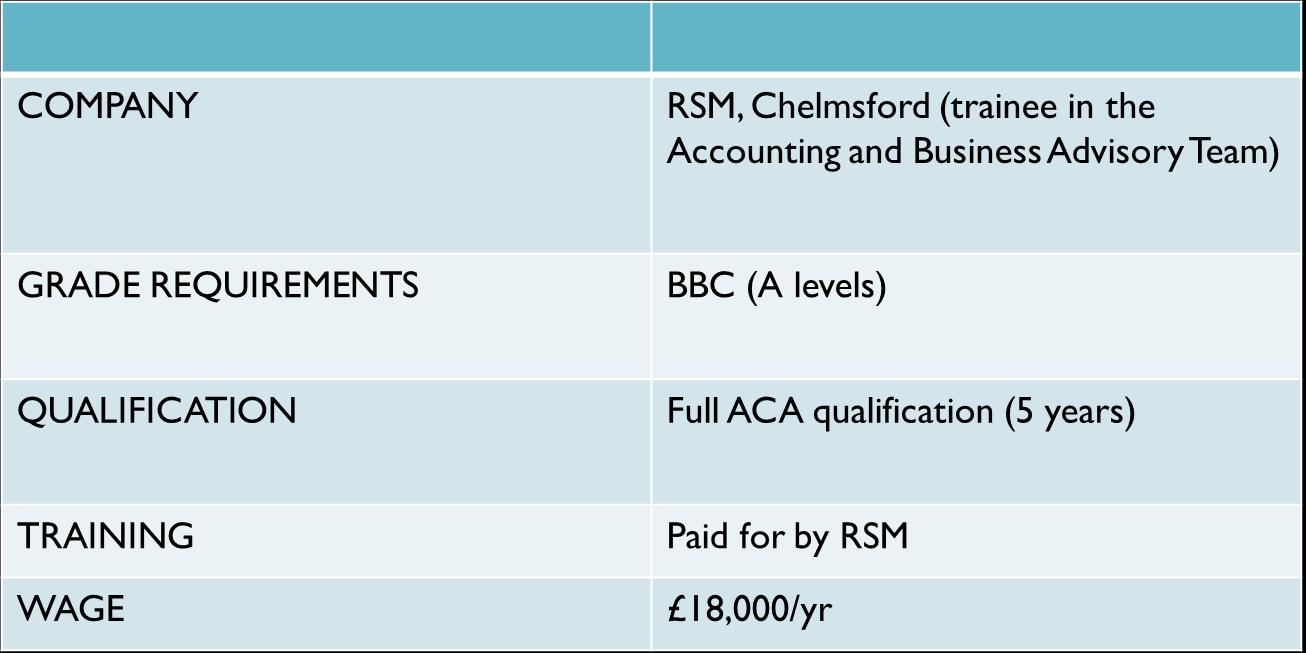
8 minute read
ALTERNATIVES TO UNIVERSITY
APPRENTICESHIPS
Apprenticeships offer a valid alternative to university, with the qualifications to match. If you choose to do a degree apprenticeship, you will still get to graduate with your cap and gown, but you will also build up several years of work experience – this is something you will not get if you undertake a standard undergraduate degree.
An apprenticeship is a job with substantial training, a way to earn and learn, gaining a real qualification, long-term career path and the possibility for higher earnings. You will not build up any university debts: you will have been earning for the length of your apprenticeship and there are no tuition fees.
An apprenticeship is not an easy option. You will be starting a challenging job and trying to prove yourself in the workplace, while getting to grips with studying for a degree. You will be expected to achieve academically and at work, managing your time and adjusting to longer hours with fewer holidays than at school or university. You might have to travel or relocate to find the right opportunity for you.
What is an apprenticeship?
An apprenticeship is a combined package of work and study. As an apprentice, you will be employed by a company and you will be paid a wage for the work that you do. Apprentices are entitled to the same rights as other employees: a contract of employment and at least 20 days paid holiday per year, including bank holidays.
You will spend most of the week at work (usually a minimum of 30 hours) watching, learning and “getting stuck in”. You will be learning from colleagues across all levels of the business, typically working closely with someone more senior who will review your progress and coach you. You will also spend time attending college, a university or training provider, training at work or online. Some apprenticeships use a combination of options; your employer will decide which method works best.
What grades do I need?
Entry requirements vary from programme to programme, and depend on the sector and prior skills.
There are hundreds of different apprenticeships on offer. From Accounting to Aerospace Engineering, new apprenticeships are being developed all the time with more highly skilled apprenticeships popping up each year. Big companies like Rolls Royce, GlaxoSmithKline, Goldman Sachs and the BBC offer degree apprenticeships, but you will also find smaller companies offering them, too. As well as being flexible and adaptable to suit changing business needs at work, you will also need to be self-motivated during independent study, and be prepared to put what you learn into practice.
Sought-after skills and qualities:
● Teamwork ● Collaboration ● Interpersonal skills ● Enthusiasm ● Motivation apprenticeships* qualities ● Communication ● Analysis ● Creative solutions ● Attention to detail ● Logical thinking ● Initiative
What are employers looking for?
An apprenticeship is designed by employers - this means you will be developing the right skills and knowledge to be a success in your chosen industry. They are looking for personal aptitude and enthusiasm rather than just your academic ability. It helps if you have a particular interest in the area you want to work in and can demonstrate this from previous experience. Anything that can demonstrate your interest and your readiness for work could help you stand out from the crowd.
Which level is the right level?
There are various levels of apprenticeship that you could apply for. Courses take between one and six years to complete depending on the level.
Apprenticeship
Intermediate
Advanced
Higher
Degree
Level
2
3
Equivalent educational level
5 GCSE passes (grade A*-C or 9-4) 2 A-Level passes/Level 3 Diploma/International Baccalaureate 4, 5, 6 and 7 Foundation, Bachelor’s or Master’s degree
6 and 7 Bachelor’s or Master’s degree
Career Prospects
The prospects for higher and degree apprentices look bright. One of the reasons businesses take on apprentices at these levels is that they need a highly-skilled workforce. This is a good thing for the company but also for you. Exactly what happens after an apprenticeship will depend on your employer and your contract. Many higher and degree apprenticeship programmes are designed to develop the leaders and managers of the future. The experiences you gain as an apprentice can provide a springboard towards promotions and higher-level opportunities. After several years
working with managers and peers, experiencing various aspects of the business and developing the essential skills and knowledge, you should have become a very valuable employee. It is not unusual for an ex-apprentice to work their way up to the boardroom.
The Recruitment Process
There can be a number of stages to get through before you even get to a face-to-face interview: an application form, online tests, perhaps a phone or online interview, before going to an assessment day. You might find that smaller organisations have a slightly more informal or personal process, perhaps involving an initial written application, followed by face-to-face interview stages if you are shortlisted.
How to apply and next steps
There are a variety of ways you can find the apprenticeship that is right for you.
1. Search for the most up-to-date apprenticeship opportunities on UNIFROG. 2. Use the ‘Find an apprenticeship’ tool on GOV.UK (https://www.gov.uk/applyapprenticeship). Once you register, you can set up email and text alerts to inform you about new apprenticeship roles. 3. You can also find a range of vacancies at https://www.ratemyapprenticeship.co.uk/, as well as thousands of apprenticeship reviews. 4. It is worth checking directly on employer recruitment sites too. Visit https://amazingapprenticeships.com/ and use ‘Vacancy snapshot’, which provides useful information on well-known employers – this may help you with your application.
When to apply:
Unlike university applications, there is no fixed deadline when it comes to applying for apprenticeships. Vacancies appear throughout the year. Do not wait until the deadline to apply; some companies close their recruitment as soon as they have sufficient candidates. As a general rule, vacancies with larger companies start appearing in the autumn, but the majority pop up from January or February onwards. Smaller businesses might start recruiting a month or two before the job starts, so if you hope to start work in August or September, you might start looking from Easter onwards.
Do check start dates closely, to make sure you will have finished school. Start your research early – the sooner the better, so you have time to fill any gaps in your CV with the things employers are typically looking for, including getting some relevant work experience. Stay focused! It is normal to have some doubts and nerves about the process, especially around April/May, when your friends have received all of their university offers and you might still be waiting to find the right apprenticeship to apply for. The key is not to panic. Keep calm and focus on making a great application when the right opportunity arises.
Can I apply for both (university and apprenticeships) at the same time?
If you are undecided between going to university or applying for an apprenticeship, you can apply for both. There is nothing stopping you from applying to university through UCAS while keeping your eye out for interesting apprenticeship vacancies. Try not to think about it as
university or an apprenticeship. You are not restricted to one apprenticeship application either –you can apply for multiple apprenticeship opportunities. However, in the end, you will have to make a decision. Therefore, ensure you research your options carefully to help you make the right choice for you.
Examples
An example of a higher apprenticeship offer that was made to a past New Hall student:
Some examples of degree apprenticeship offers that were made to past New Hall students:


A Focus on Degree Apprenticeships:
• It is a growth area • You still get to graduate with your cap and gown • In addition, you will have built up several years of work experience • No university debts - no tuition fees and you will have been earning for the length of your apprenticeship • Average student debt after completion of undergraduate degree = £40-50k • Degree apprenticeship = c.£15/16k/year wage and no debt • c.£100k difference
Degree Apprenticeships things to think about:
• A degree apprenticeship will not suit everybody (however, a standard university degree doesn’t suit everybody) • Student experience will differ from a standard degree course • You will experience campus life but only up to a point • You won’t be living in halls of residence • Motivation is key - degree apprenticeships are tougher than doing a degree • You will be expected to achieve both academically and at work, managing your time and adjusting to longer hours with fewer holidays than at school or university
Apprenticeships general points to consider
• Is there a real job at the end of it? • Will I have the same status in the company as somebody who has a standard degree? • Can I move into a management role? • Will your education be as broad as if you went to university? • Am I suited to university? Would an apprenticeship suit me better? • Do I know what I want to do? If not, a standard degree might be the most suitable option. • You could apply to university and apply for apprenticeships (keeps your options open).
How we aim to support you?
A support programme is in place for those students who want to apply for apprenticeships. We have connections with a company, Pathway CTM, which offers significant and professional support for our students (https://pathwayctm.com/ )The students are given a variety of opportunities to find out about apprenticeship opportunities through presentations from representatives from Pathway CTM and by visiting the National Apprenticeship Show. Pathway CTM, to which students have access, provides assistance to all students who make apprenticeship applications. This includes (if required) helping them put together a CV, helping them to complete application forms, and giving them advice about assessment days and interviews. Tailored mock interviews can also be arranged. Furthermore, Pathway CTM offer a mentoring programme that the students can access for further support with any applications they make.
Although interest varies from year to year, over the last few years our students have received some excellent offers (for higher/degree apprenticeships) from a variety of well-known and wellrespected companies including those listed below. For the vast majority of these, the balance between paid work and training within an exciting work environment has proven to be an outstanding choice for these individuals.
• UBS
• RSM • Moore Stephens
• Mott MacDonald
• Unilever • Weston Homes
• PwC • AON









